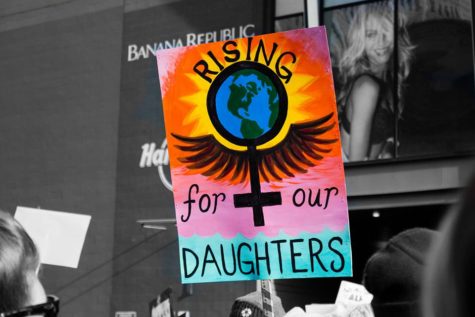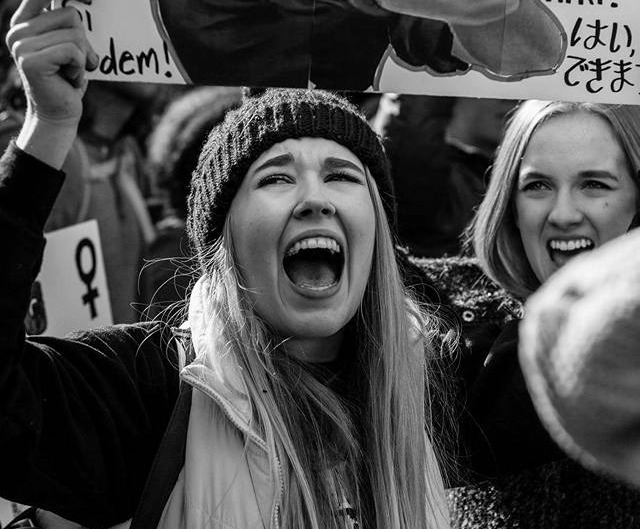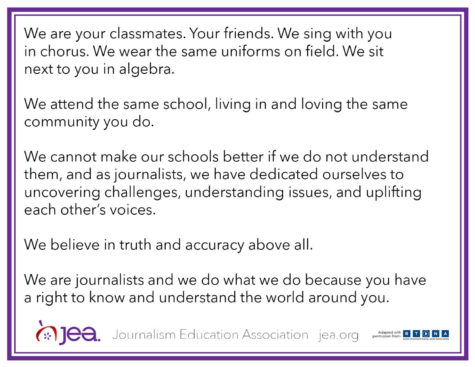We March So Our Daughters Never Have To
January 22, 2018
Saturday, January 20th was the one year anniversary of the Women’s March on Denver. Thousands of men, women, and children gathered in Denver Civic City Park with signs, pink hats, and a common belief. Among many, many other things, those gathered were marching for the equal treatment of women and minorities; in support of sexual assault survivors; in support of the freedom of choice in all areas and the legitimacy of science. For the second year in a row, Denver showed up and showed out for this day. And, oh, we noticed.
I didn’t march on Saturday. Instead, I spent the day with my mom and saw The Post. We called it “Journalism Geek Saturday Night,” as we are both extremely fascinated by the seemingly most antiquated form of media there is: newspapers. I was excited to see an inspiring film about the importance of speaking truths and the power and responsibility media has in our country. And I did see a movie that discussed those things. It was one of the best movies I’ve ever seen. I could write a whole series of articles dissecting every scene, explaining its relevance and importance and beauty (I mean it starred Tom Hanks and Meryl freaking Streep and it was directed by Steven Spielberg; how much better can a movie get?). But what had me in tears wasn’t when the court ruled that “the founding fathers gave the free press the protection it must have to fulfil its essential role… to serve the governed, not the governors,” (Okay, I did cry there, too.) but when Meryl Streep, who played the publisher of the Washington Post, Katherine Graham, was walking out of the Supreme Courthouse with the eyes of all women on her in amazement.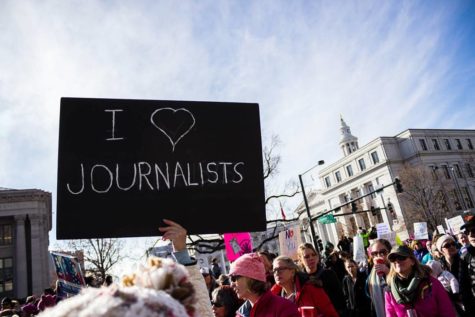
She was the only woman walking out of that courthouse. The only woman on her own board for the Washington Post. The only woman with an opportunity to speak. But she still wasn’t heard. The parallels between workplace norms in 1971 and now was hollowing. It felt as if nothing has changed in the last 50 years or so. In one moment I was empowered by my voice and the next diminished by the minimal impact it would have.
I remember last year I was asked several times, by men and women, what the Women’s March is even for. They’d say things like, “women already legally have equal rights as men, what else could they want?” and, “women are already so much better off than they were in the past, why are they complaining?”
The Women’s March is for the Katherine Grahams. For the publisher who does not have a voice in her own newspaper. The March is to strengthen the volume of women’s voices.
We have the right to use our voices now and are given many opportunities to do so, yet our voices are still overlooked. This goes unnoticed because it quietly became a part of societal norms. Women definitely have opportunities to voice their opinions and be heard. But the difference between women’s and men’s opinions is that men’s opinions are more often considered in decisions making while women’s aren’t. Our voices become smaller and smaller. I’d also add, our voices are already quieter than men’s due to under representation in executive positions and leadership roles. With these two things combined, women are almost completely silenced. This is what we are changing.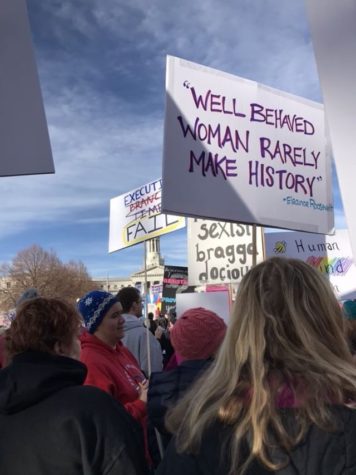
In 2017, women were sick of being silenced. In October of 2017, the Me Too movement on social media gave women a safe platform to voice their personal experiences with sexual assault. The goal was to prove that sexual assault is too common, and judging by the overwhelming use of sexual assault hotlines since then, it has. Now, women don’t want to just call attention to this issue, they want to put an end to it. The Time’s Up movement, which gained attention toward the end of 2017, is acting on the issue. Through donations to the TIME’S UP Legal Defense Fund, the organization is supplying legal defense to sexual assault cases. This is what the March is about.
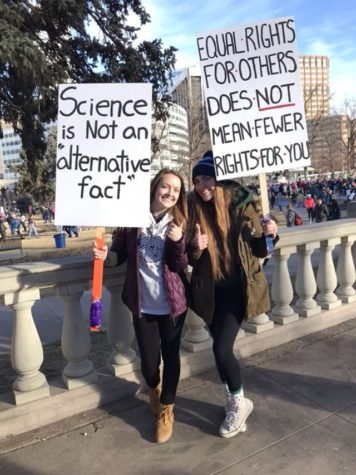
Many passionate women at Broomfield marched on Saturday with other women who inspire them. Senior Paige Lewis marched with her sisters, Skye and Gwen, and her mom. Paige was marching to “support equal rights for everyone,” as well as the Me Too movement, the validity of science, and feminism. “The experience itself was really moving and made both Gwen and me very emotional,” Paige said, “It was beautiful to see so many passionate people who want to create a positive future for our country.”
Peyton Doyle also marched on Saturday with her sisters and friends. “The march brought so many people together and allowed everyone to have confidence and power to raise their voices, which I feel is so incredible,” she said.
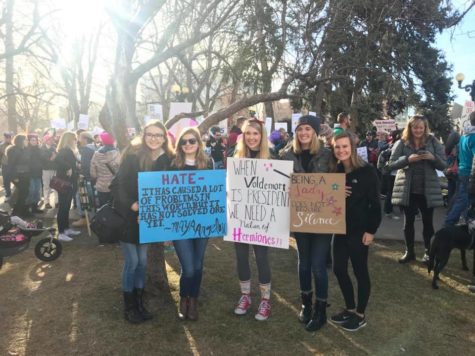
Seniors Alyson Rotman, Meredith Frey, Avery Sandstrum, Francie Traxler, and Camille Wilcoxen marched together along with their families. Rotman was marching for “equality for all people no matter their race, ethnicity, religion, sexuality, or gender.” Because of her age and privilege, Alyson feels her voice is sometimes taken for granted, but she said, “being surrounded by 150,000 other strong men and women is really empowering. It’s nice to be reassured that more than just my family and friends believe in the strength of women.” The March has inspired her to continue to use her voice to speak up for women who are less privileged than she is.
Katherine Lopez has a similar goal to Rotman. “This year I marched for DACA (Deferred Action for Childhood Arrivals) students,” she said, “it’s been a rough year and we have to keep fighting for our education so that we can go further and accomplish things our parents came here for.” She described the unity in Denver Civic Center Park as an inspiration and hopes that the work women are putting in now inspire the generations to come.
The Women’s March is more than just a gathering for those who care. It’s not just a one day thing, it’s very much a revolution. Now is the time to listen to the silenced: because you will no longer be given an option. We will be heard.
We march for our voice. We march against double standards and stereotypes. We march against sexual abuse. We march for choice. We march so our daughters never have to.
